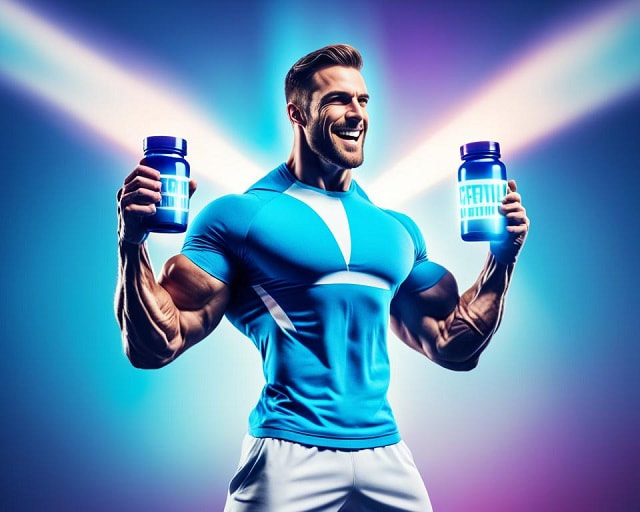|
As a cornerstone of fitness supplementation, creatine supplements stand unrivaled in their ability to support muscle growth and energy enhancement. Fitness enthusiasts and athletes alike hail the profound impact these supplements have on workout performance and strength gains. It's not just about packing on size; it's about channeling the vigor required to power through each session and recover with resilience. This article aims to demystify creatine monohydrate and unpack its myriad benefits. Whether you're starting out on your fitness journey or looking to fine-tune your regimen, understanding how to harness the full potential of creatine is crucial for attaining your peak physical condition. Key Takeaways
Understanding Creatine Monohydrate and Its Benefits https://www.youtube.com/watch?v=-mmpvk3VLkc Known widely in the fitness community as a powerful performance supplement, creatine monohydrate is recognized for its pivotal role in enhancing muscle energy and athletic performance. Primarily stored in the muscles, creatine is an amino acid derivative that helps produce energy during heavy lifting or high-intensity exercise. It is synthesized in the body and can also be obtained through dietary sources such as meat and fish. Comprehensive research featured in peer-reviewed articles has systematically unpacked the myriad creatine benefits. These findings spotlight the positive effects of the best creatine monohydrate pills on strength, endurance, and muscle mass, making it one of the most popular supplements in strength and conditioning programs. Here's an overview of the benefits that creatine monohydrate brings to the table:
Given its influential effects on energy production and work output, many consider creatine monohydrate an indispensable supplement in the pursuit of peak physical performance. Incorporating it into a muscle-building regimen is not only common practice but also supported by a wealth of scientific backing for its efficacy and safety. Builds Muscle Mass AND Maximize Energy Boost with Creatine Monohydrate Pills Unlocking the full potential of creatine monohydrate involves a deep dive into its scientifically-backed benefits. From carrying out rigorous creatine research to acknowledging its significant influence on strength training, we see how this supplement is a powerhouse for those aiming to increase lean muscle. But how does creatine actually work its magic on the body's complex systems? Let's explore the details. Scientific Research on Creatine's Effect on Muscle Mass Various studies have consistently linked creatine supplementation with an impressive increase in muscle mass. Whether you're an athlete or a fitness enthusiast, this compound has proven to be an essential ingredient in the recipe for muscular growth. It's not merely about size; it's about fostering quality, lean muscle that's as strong as it appears. How Creatine Enhances ATP Production for Increased Energy At the molecular level, creatine plays a pivotal role in energy metabolism. It serves as a critical component in the synthesis of adenosine triphosphate (ATP), your cells' primary energy currency. During high-intensity workouts, ATP stocks are quickly depleted. Creatine supplementation helps sustain ATP production, enabling longer, more intense training sessions and ultimately aiding in energy enhancement. The Role of Creatine in Muscle Recovery and Growth Post-exercise recovery is as crucial as the workout itself for muscle growth. Creatine research offers substantial insights into its benefits for muscle recovery. By reducing damage and inflammation, it facilitates faster recovery times, supporting muscle hypertrophy and repair. This rapid recuperation is key to consistent progress and long-term gains in both strength and size. - Increase in Lean Muscle Mass supports protein synthesis and muscle fiber growth and enables higher volume and intensity workouts. - Enhanced ATP Production maintains energy supply during short, intense exercise and delays fatigue, allowing for more explosive movements. - Improved Muscle Recovery reduces post-exercise muscle damage and accelerates the readiness for the next training session. Optimal Dosage and Timing for Creatine Supplementation For those seeking to enhance their workout performance and gain muscle mass, understanding the intricacies of creatine dosage and supplement timing can make a significant difference. Getting these aspects right is critical for maximizing the effectiveness of creatine monohydrate supplements and ensuring optimal absorption rates. Let's explore how to carefully calibrate your creatine intake. Determining the Right Amount of Creatine for Your Body Type Recommended creatine dosages vary depending on individual fitness goals and body types. It is generally advised to begin with a standard dose of 5 grams per day. However, some individuals may require higher doses to see substantial benefits, especially athletes and bodybuilders with higher muscle mass and energy demands. Understanding the Loading Phase and Maintenance Phase The creatine loading phase is an initial period where higher doses of creatine are taken to rapidly saturate your muscles. A typical loading phase lasts about 5-7 days and involves a daily intake of 20 grams, divided into 4 servings of 5 grams each. After loading, you enter the creatine maintenance phase, maintaining creatine levels with a smaller daily dosage—usually around 3-5 grams. Best Times to Take Creatine for Maximum Absorption Supplement timing is also a key factor, with multiple studies showing that taking creatine pre- or post-workout could enhance its absorption rates and benefit muscle recovery and growth. Consuming creatine with a meal or with carbohydrates can further aid in absorption due to the spike in insulin levels, which helps shuttle creatine into muscle cells. By fine-tuning these variables, you can set the stage for outstanding enhancements in muscle strength, performance, and recovery. The Connection Between Creatine, Diet, and ExerciseUnderstanding the synergistic effects between creatine and nutrition is pivotal for anyone aiming to maximize their workout routines and enhance endurance training. Creatine supplementation, when paired with a balanced diet, can supercharge muscle growth and performance like few other combinations in the realm of sports nutrition. Integrating creatine with an assortment of specific nutrients can propel its efficacy. For instance, carbohydrates have been shown to amplify creatine absorption, suggesting that a post-workout shake with both carb content and creatine is more than just tasty—it's a strategic move for your muscles. Meanwhile, foods rich in protein can assist in maximizing the muscle recovery process. The key to unlocking creatine's maximum potential lies not just in supplementation, but also in the company it keeps on your plate. Different workout routines often call for nuanced approaches to creatine use. For those engaged in endurance training, the focus may be on how creatine helps mitigate the quick depletion of energy reserves. In contrast, individuals keen on strength and power sports might leverage creatine for its ability to enhance intense, short bursts of activity.
Ultimately, those aiming to harness the full strength of creatine supplementation must integrate it into their nutrition and exercise regimes thoughtfully and deliberately. Taking the time to understand how diet can affect creatine's impact on the body will pay dividends in both short-term performance and long-term gains. Addressing Common Myths and Misconceptions About Creatine When it comes to enhancing athletic performance and building muscle, creatine is surrounded by a cloud of myths and misconceptions. It's essential to separate fact from fiction to understand the true impact of creatine supplements on health and exercise efficacy. In this section, we'll tackle some of the most pervasive creatine myths, specifically relating to hydration, muscle cramps, long-term safety, and kidney health. Debunking the Myth of Creatine Causing Dehydration and Cramping One common concern is that creatine supplementation leads to dehydration and muscle cramps. However, numerous studies suggest that creatine does not cause dehydration but may actually assist in maintaining hydration levels. Furthermore, there is no scientific evidence linking creatine directly to increased muscle cramping; this myth possibly stems from anecdotal reports rather than research-based findings. Is Creatine Safe for Long-term Use? What Studies Say Questions surrounding the long-term safety of creatine are frequently raised. To address these concerns, health professionals have scrutinized years of data, and the consensus among researchers is that long-term creatine use is safe for individuals without pre-existing renal conditions. This is supported by testimony from professionals globally who monitor and suggest creatine's continual use in appropriate doses. Examining the Impact of Creatine on Kidney Function and Health Another area of significant interest is the impact of creatine supplementation on kidney function. While it's crucial to consider existing health conditions, substantial evidence indicates that for individuals with healthy kidney function, creatine poses no harm to renal health. In fact, claims linking creatine to kidney damage are largely unsupported in the scientific community. To further illustrate the realities and dispel myths about creatine, let's examine the following table, which compares common misconceptions with scientific findings: Creatine leads to dehydration and increased muscle cramps: Research does not support the connection between creatine and dehydration or muscle cramps. Some studies suggest creatine may help maintain hydration status during intense exercise. Long-term creatine use is unsafe and can cause health issues: Long-term studies and health expert testimonials have verified the safety of sustained creatine intake when taken at recommended doses. Creatine supplementation poses risks to kidney health: No evidence has been found that creatine supplementation in recommended amounts harms kidney function for individuals with healthy kidneys. As we strive for strength and vitality through our fitness journeys, it's imperative to make informed decisions based on facts rather than fallacies. Understanding the actual effects of creatine and its usage can help you effectively incorporate it into your regimen without unsupported fears affecting your choices. Choosing the Right Creatine Monohydrate Supplement When it comes to supplement selection in the supplement industry, the abundance of options can be overwhelming. However, for those aiming to enhance their athletic performance with high-quality creatine, understanding how to identify product purity and trusted brands is crucial. Below, we've compiled a guide to help you navigate the market and select the best creatine monohydrate supplement for your needs. First and foremost, purity should be your top priority. Look for brands that offer creatine monohydrate with no added unnecessary fillers or artificial ingredients. This ensures you're getting a product that is both effective and safe for consumption. Moreover, consider the reputation of the brand. Companies that have a long-standing presence and positive reviews in the supplement industry are often more reliable, providing you with assurance in the consistency and quality of their products. Another key aspect is third-party testing. Supplements that have been independently tested for quality and safety offer an extra layer of trust. Such testing should confirm that the product contains the advertised amount of creatine and doesn't have harmful contaminants. To sum up, your optimal supplement selection involves scrutinizing product labels, understanding the supplement industry standards, and doing a bit of research on the trusted brands themselves. Prioritizing product purity and the presence of third-party testing certifications will lead you to a high-quality creatine supplement that's right for you. Incorporating Creatine Pills into Your Fitness Regimen
Enhancing your fitness strategy and achieving workout goals can find support from a well-implemented supplement routine. Creatine monohydrate pills have become a cornerstone in the realm of performance supplements, lauded for their ability to blend seamlessly with various training programs. Bodybuilders, powerlifters, and fitness enthusiasts committed to comprehensive fitness have reported significant gains by incorporating these supplements into their daily regimen. By understanding your body's response to creatine and tailoring your intake to your specific fitness demands, you create an environment conducive to muscle growth and enhanced energy. For those seeking to optimize their results, tracking performance and recovery metrics can be instrumental when supplementing with creatine. This facilitates fine-tuning your approach to supplementation in line with your workout goals. By considering factors such as strength improvements, endurance levels, and muscle recovery times, you enable a data-driven approach to supplementation, ensuring creatine serves your body's needs at each stage of your fitness journey. Moreover, regular assessments can guide any necessary adjustments to dosages or timing, ideally discussed with healthcare professionals or nutrition experts. The real-world effectiveness of integrating creatine into a fitness regimen is well-documented through the experiences of professional athletes and fitness experts. These individuals often share how the targeted use of creatine pills has elevated their performance metrics and supported their rigorous training. Their collective experiences serve as a robust testimonial to creatine's ability to enhance not only muscle strength and volume but also to improve overall athletic performance. Whether your aim is to dominate on the competitive stage or simply to elevate your personal health and fitness, creatine monohydrate stands as a proven ally in the journey toward peak physical prowess.
0 Comments
Leave a Reply. |
AuthorWrite something about yourself. No need to be fancy, just an overview. Archives
June 2024
Categories |



 RSS Feed
RSS Feed
